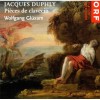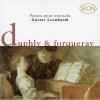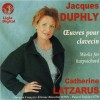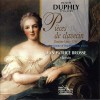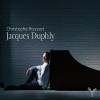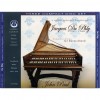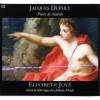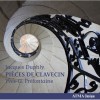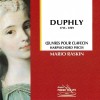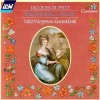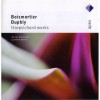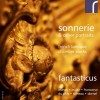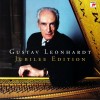Composers
Jacques Duphly (January 12, 1715 – July 15, 1789) was a French harpsichordist and composer.
He was born in Rouen, France, the son of Jacques-Agathe Duphly and Marie-Louise Boivin. As a boy, he studied the harpsichord and organ, and was employed as organist at the cathedral in Évreux.
His teachers were François d'Agincourt and Jean-Jacques Rousseau. Later, Rousseau would ask him to contribute to his dictionary, for articles relating to the art of playing the harpsichord.
In 1742, after the death of his father, Duphly moved to Paris, where he became famous as a performer and teacher.
He published four volumes of harpsichord music in 1744, 1748, 1756 and 1768.
He was considered by Pascal Taskin, the harpsichord maker, to be one of the best teachers in Paris.
He retired from public life - disappeared -, and people have been looking for him: in 1788, an advertisement in the Journal Général de la France asked: We want to know what happened to M. du Phly, previously harpsichord master in Paris, where he was in 1767. If he does not exist any more, we would like to meet his heirs, to whom we have a communication to make.
He died on July 15 1789, the day after the storming of the Bastille, in an apartment in the Hôtel de Juigné, lonely, forgotten, with his library - and without a harpsichord. A tip of the mystery veil could be lifted by this fact: in 1785, Antoine de Sartine, ex-chief of Police, and ex-minister of the Navy, lived at the same address. Duphly left his possessions to his servant, who was with him for 30 years.
Only fifty-two works by Duphly are known, most of which were published during his lifetime in the four volumes of harpsichord music mentioned above. The titles of the work refer to well-known protectors of art (e.g. La Victoire, la de Sartine) or other composers (e.g. La Forqueray). His late music contains elements typical of the early classical movement - e.g. the use of Alberti bass, quite dissimilar to Jean-Philippe Rameau or François Couperin.
Recently Added
Biography
Jacques Duphly (January 12, 1715 – July 15, 1789) was a French harpsichordist and composer.
He was born in Rouen, France, the son of Jacques-Agathe Duphly and Marie-Louise Boivin. As a boy, he studied the harpsichord and organ, and was employed as organist at the cathedral in Évreux.
His teachers were François d'Agincourt and Jean-Jacques Rousseau. Later, Rousseau would ask him to contribute to his dictionary, for articles relating to the art of playing the harpsichord.
In 1742, after the death of his father, Duphly moved to Paris, where he became famous as a performer and teacher.
He published four volumes of harpsichord music in 1744, 1748, 1756 and 1768.
He was considered by Pascal Taskin, the harpsichord maker, to be one of the best teachers in Paris.
He retired from public life - disappeared -, and people have been looking for him: in 1788, an advertisement in the Journal Général de la France asked: We want to know what happened to M. du Phly, previously harpsichord master in Paris, where he was in 1767. If he does not exist any more, we would like to meet his heirs, to whom we have a communication to make.
He died on July 15 1789, the day after the storming of the Bastille, in an apartment in the Hôtel de Juigné, lonely, forgotten, with his library - and without a harpsichord. A tip of the mystery veil could be lifted by this fact: in 1785, Antoine de Sartine, ex-chief of Police, and ex-minister of the Navy, lived at the same address. Duphly left his possessions to his servant, who was with him for 30 years.
Only fifty-two works by Duphly are known, most of which were published during his lifetime in the four volumes of harpsichord music mentioned above. The titles of the work refer to well-known protectors of art (e.g. La Victoire, la de Sartine) or other composers (e.g. La Forqueray). His late music contains elements typical of the early classical movement - e.g. the use of Alberti bass, quite dissimilar to Jean-Philippe Rameau or François Couperin.

